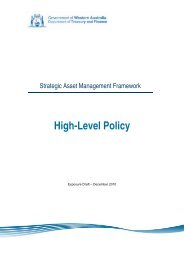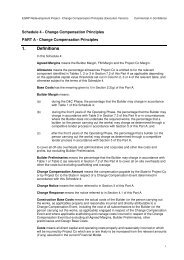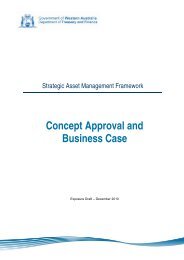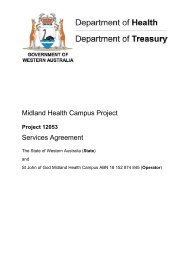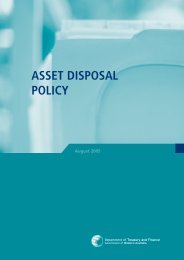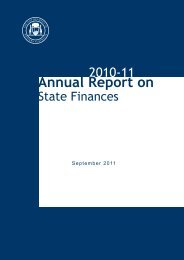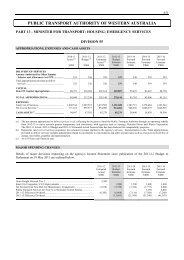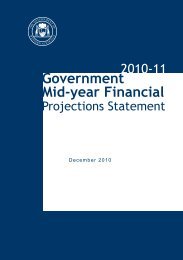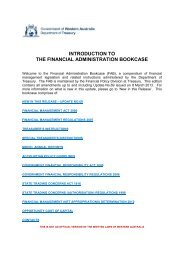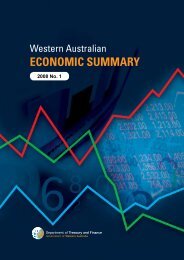No. 3 - Department of Treasury - The Western Australian Government
No. 3 - Department of Treasury - The Western Australian Government
No. 3 - Department of Treasury - The Western Australian Government
Create successful ePaper yourself
Turn your PDF publications into a flip-book with our unique Google optimized e-Paper software.
<strong>Western</strong> <strong>Australian</strong> Economic Summary2006 <strong>No</strong>.3Is Output the Key?<strong>The</strong> close connection that economics generally assumes betweenproductivity and economic welfare is based on the expectation that thecapacity <strong>of</strong> an economy to produce is closely linked to the capacity <strong>of</strong> itscitizens to consume.For an economy in economic isolation, this is necessarily true, as the onlygoods and services available for consumption are those produced locally.Price movements do not affect overall economic welfare, as a price changethat benefits one group (e.g. producers) disadvantages another (e.g.consumers).However, when economies trade, this is not necessarily the case. <strong>The</strong> goodsand services available for domestic consumption comprise not only localproduce, but also the things that can be exchanged for local produce 1 .Changes in a country’s export prices relative to its import prices (the “terms<strong>of</strong> trade”) can therefore have significant effects on its capacity to consume,largely independent <strong>of</strong> its capacity to produce.In practice, for most economies over the longer term, these terms <strong>of</strong> tradeeffects on potential consumption are fairly small relative to the influence <strong>of</strong>domestic production. This is because exports typically represent a relativelysmall share <strong>of</strong> total production, and because terms <strong>of</strong> trade swings areseldom sufficiently pronounced to have a large effect, and anyway tend tobalance out over time.For example, Productivity Commission commissioned Meyrick andAssociates to undertake a quantitative study <strong>of</strong> the effect <strong>of</strong> changes in theterms <strong>of</strong> trade on living standards in Australia.<strong>The</strong> main conclusion from this study is that, taken over long time period <strong>of</strong>several decades, changes in the terms <strong>of</strong> trade have relatively little impact onwelfare 2 .This is because welfare benefits from improvements in the terms <strong>of</strong> trade inone period have been <strong>of</strong>fset by losses from subsequent deteriorations in theterms <strong>of</strong> trade.However, because the study covers the period 1960 to 2004, it omits thecontinued upswing in the terms <strong>of</strong> trade since the survey period and thusarguably understates the importance <strong>of</strong> the terms <strong>of</strong> trade on welfare 3 .1 An open economy might also consume more than it produces by running a tradedeficit, but that is not relevant to this article.2 Over the past four and a half decades, changes in terms <strong>of</strong> trade have increasedreal income by less than 5% in aggregate.3 Since 2004 the terms <strong>of</strong> trade have risen by more than 15%.64 <strong>Department</strong> <strong>of</strong> <strong>Treasury</strong> and Finance



